#genshin meta
Text
Venti and Diona's interaction in the alchemy event is so special to me... because Diona is someone who really hasn't had any reliable parental figures in her life at all. Her father is a drunkard who barely has any time for her. She got her vision because she walked into the pouring rain as a child, all alone, terrified, to look for her drunk father in a forest full of animals and monsters and bring him home. Her father takes better care of Razor than her. She was so lonely she talked to a spring in the hopes that the rumours were true and there really was a fairy inside, listening. And then the voices that used to answer stopped, too. Leaving her with nothing but a curse- any drink she mixed would be divine. She's only twelve at most and she works in a bar. Her employer exploits her skills for profit. There's advertisements around Mondstadt advertising Diona's drinks specifically. Everyone loves them. Diona hates them. Everyone tells her how lovely her drinks are. Diona herself, despite despising alcohol, is proud of her skills. That's so fucked up. That's all so fucked up.
There's so many jokes about "haha child wants to destroy the wine industry but works in a bar" and while I can see why people find it funny they're honestly...so tasteless. Diona is a child who villainizes alcohol because she can't bear the thought of her father being at fault for his actions because she loves him so much. That he could drink less and he could spend more time with her and he could help her with her emotions but never does. That he could spend time with her and immerse himself in her interests but he never does. That he's willing to do all this for other people instead, but not her. That he chooses to do these things for other people, but he almost never chooses to do them for her.
But Venti does. Venti chooses to do all these things with Diona. He calls all residents of Mond his children and that's Diona too. He takes the time to search Dragonspine for an ingredient she might like, he chats with her and accompanies her to the location of the alchemy event, he presumably spends hours with her as she searches for ingredients and mixes her drink, keeping her company and making sure she's safe.
He doesn't have to do this. He doesn't have to patiently endear himself to her because he knows she hates people who drink, he doesn't have to bother going all the way to Dragonspine to find her something unique because he knows she's proud of her creations, he doesn't have to spend hours in the company of a lonely child who he has nothing in common with-but he does.
So many people would think he's doing it for the drink, but they all lack reading comprehension skills because I said so. Diona wants to create a drink which keeps people sober. Venti isn't going to get drunk and he's not doing it for the drink. It isn't pity either, it's affection- he loves his child and he wants to spend time with her and make sure she's safe. That's all. They're so special to me <3
Oh and another thing that I forgot to add- the Spring Fairy Diona talked to, Callirhoe, only found the spring in Springvale thanks to "a gentle breeze guiding her." The person who listened to the cries and rants of a lonely child was also coincidentally someone guided there by Venti. Still girlie why that specific blessing 😔
#i can't deal with it#i needed to get it out there#my heart#venti#diona#alchemy event#genshin impact#barbatos#genshin meta#diona katzlein
560 notes
·
View notes
Text
i find diluc’s grief to be so realistic because when your family is torn apart and the closest confidant you have seemingly has lied to you your whole life and the very organization you used to believe stood for honor and protecting the people turns out to be slimy and wants to cover up their own mistakes which means there will be no answers or justice for your father... like of course he was so full of anger and pain for so long. the injustice and betrayal of everything he ever knew and believed in was more than he could handle. but it’s also so touching to me that now he is trying to see the good in life again and the beauty of his homeland. the hawk he carries is like a symbol of him finally looking up at the sky again, lifted up by the wind after so long burning alone
511 notes
·
View notes
Text

the contents page so far for my essay on queercoding in genshin through the exploration of alhaitham and kaveh (The Essay is double spaced for my convenience!!)
So my laptop died!! With all my files on it!!! But quite literally the final few minutes before it short-circuited, i emailed the newest version to myself <33333
Update: The essay is live! It's available to read here and here as a pdf <3
#i have to redo my reference list along with trying to sort out a new laptop#and finding a laptop that will hold two hard drives?? in this day and age??#but the essay should be posted Soon!!#thank you for all your encouragement!!#alhaitham#kaveh#haikaveh#kavetham#genshin meta#haikaveh meta
177 notes
·
View notes
Text
Let Furina be brave. Let her be resolute.
Not as a demand, but as a prayer, an invocation. What I mean is:
Sure, may Furina be the meme thing. The spoilt youngling demanding entertainment, the figurehead socialised as a celebrity who's yet to learn she's out of her depth. (All the Archons have their comic traits; it's practically a required part of the gacha character formula.)
And certainly, let Furina be the sad thing. An undersocialised kid trapped beneath the mantle of celebrity. A fledgling god trying to avert a prophecy barely anyone understands. Neuvillette is the closest thing she has to a peer: he keeps his worries and his thoughts to himself, and treats her like a hatchling in need of protection. (Some Archons see their own faces in the mirror and grieve. Some Archons brought themselves up and never learnt their value. Some Archons shoulder the grievances of the world.)
But so too are Archons heroes.
Let Beelzebul and Morax be impassive warriors parting the seas of battle like scythes; let Barbatos slip between the shadows with ancient secrets on his lips; let Buer see the unseeable and dream a braver world into being. They are their own kinds of godlike figures, all badasses in their own way.
Let Furina be brave. Let her story be the eternal coming-of-age, the endless cycle of discovering, internalizing, showing the world that the power was within her all along.
No, Furina isn't the toughest of gods. She may not be the kind of hero who dodges every punch. Beisht might slam her into the rocks, Subject Three might get a lucky sneak attack on her, the villain du jour might kick her while she's down... But. But but but. Although Justice may be delayed, impeded, thwarted at every turn? So long as rain falls and rivers flow, Justice will not be stopped.
So let Furina be the kind of hero who, when the enemy strikes her down, picks herself off the ground. The kind of hero who rises to her feet, wounds and all, spitting blood (or whatever the naiad(?) equivalent is), leaving her opponent to say, "really?; really?" as they crack their knuckles and begin round seven.
Let Furina be the kind of hero who keeps trying. The hero who learns from every setback. The hero who slays the beast on the tenth go-around. The kid who is way out of her depth but, perhaps by dint of sheer divinity, exists in a world where resolve, tenacity, stubbornness are what matters. And then let Furina be resolute.
#furina#focalors#genshin impact#genshin meta#ty to chrysoula for heavily informing this reading‚ intentionally or not!#my writing
346 notes
·
View notes
Text
the narrative of kaveh being an idiot is so baffling to me because he is, quite literally, canonically considered a genius…? why is the popular consensus “6000 IQ alhaitham and his lovably stupid roommate kaveh” when every npc commenting on kaveh refers to his intellect & talent, the literal god of wisdom says kaveh has an “almost-perfect grasp of what it truly means for sumeru to be a nation of wisdom” (whereas she questions alhaitham’s wisdom in her line about him), and alhaitham’s own story profile calls kaveh a genius multiple times??? like the whole point is that he’s alhaitham’s intellectual equal despite having entirely separate worldviews and demeanors, which frustrates alhaitham to no end — ‘how can someone so smart do all of these things that, to me, are so evidently stupid?’ the takeaway from their dynamic should NOT be kaveh is dumb, but rather that empathy and emotion aren’t actually the opposites of logic and intelligence, but sadly both alhaitham and the realm of academia as a whole are too blinded by their own definitions of logic to fully realize that.
tl;dr kaveh is not dumb by any standards and i will prove it
(under the cut: quotes/screenshots/etc proving this + more. please spread the gospel and dispel ignorance. amen)
some npc voicelines (there are more but i’m lazy):


these are pretty self-explanatory — kaveh is a widely-renowned scholar, architect, and engineer throughout sumeru. he graduated from the akademiya with flying colors, students were desperate to take his classes, etc.
nahida’s voicelines:
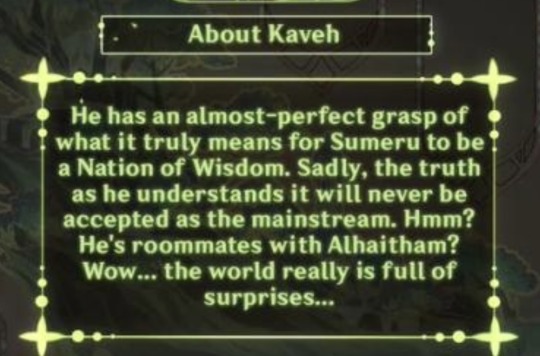
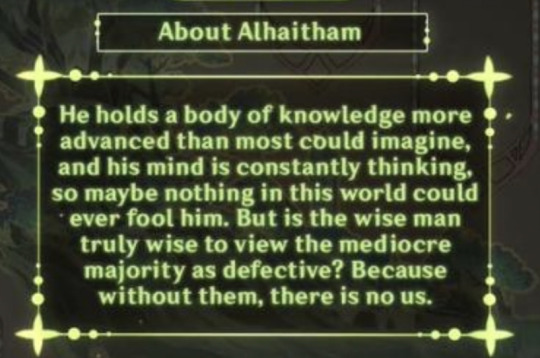
both are intelligent but only one is wise: kaveh. alhaitham is too restricted by his narrow definition of wisdom (read: what he deems ‘logical’) to look beyond himself and grasp that there’s more to intellect and knowledge than pure cold rationality. he can’t comprehend that empathy and intellect aren’t fundamentally incompatible — in fact, they’re best when put hand in hand. kaveh is one of the few scholars capable of valuing emotions, empathy, and artistic endeavors, while the rest of the akademiya closes themselves off to that entire realm of knowledge from the get-go. this is what makes kaveh uniquely wise, and what alhaitham lacks. until you understand that emotions and logic can and should coexist, you won’t be successful in the true pursuit of knowledge.
last but not least:
alhaitham’s profile (worth noting that profile stories are pretty much the most reliable source of information on characters’ true beliefs and opinions — their voicelines are still them putting on acts in front of the traveler, but these stories are told from the perspective of an omniscient narrator and are likely closer to the truth):

“two geniuses.” and even after their falling out, “neither of them will deny the other party’s exceptional brilliance” — meaning alhaitham considers kaveh to be exceptionally brilliant. point blank. in the text bro

hilarious line — it’s basically alhaitham saying he doesn’t understand how someone with kaveh’s talent and intellect could have a personality/worldview so different from haitham’s. ‘how can someone that smart be so annoying!!!!!’ and ofc by values we know it’s referring to kaveh’s idealism, empathy, and affinity for the arts

alhaitham considers kaveh to be “another genius,” someone who is so much his intellectual equal that he’s “an excellent mirror” for alhaitham. it’s like an experiment for him — the initial question is “how can someone as smart as me care about all of these things i’ve always believed to be worthless,” the subjects are kaveh and alhaitham, the controlled variable is their intellect. because their intellect is the same, alhaitham is able to study their differences (can’t attribute said differences to varying intellect). alhaitham would never say it out loud — and luckily he doesn’t need to bc his character story tells us — but he’s deeply fascinated by kaveh bc kaveh’s very existence is a threat to haitham’s worldview, & he’s letting kaveh stay with him bc through kaveh, alhaitham learns about not just himself but the outside world and humanity as a whole, and as a scholar, there’s nothing more valuable. (also because he feels comfortable with kaveh [“he’s a familiar face”] and they’re both lonely [“similarly lacks familial attachments”] lol these two are never beating the We Know You Don’t Actually Hate Each Other allegations but that’s a different point so i digress)
IN CONCLUSION:
this is all just the TEXTUAL evidence — people saying “kaveh is smart” — and doesn’t even include all of the obvious implicit signs of kaveh’s intellect (no one who graduates from the akademiya w honors and teaches classes there could be anything other than incredibly intelligent, al “i don’t do anything that i don’t want to do” “i’m not going to bother explaining it to you because you won’t understand” haitham not only puts up with but actively seeks out debates with kaveh which he absolutely would not do if he didn’t respect him or consider him to be of roughly equal intellect, look at the debates he has w alhaitham on sumeru messageboards and TELL ME those messages sound like they were written by an idiot or itto or something [you cant], etc etc etc).
and also this is all from 3.3 (+ 3.4 alhaitham leaks)! we don’t even know kaveh’s rarity yet, that’s how far he is from being playable, but there’s already this much information on just how smart he is! it’s the main thing we know about him — 1) he’s smart, 2) he’s passionate/driven by what he feels is right! why does that keep turning into “LOL HOTHEADED HIMBO”??!
okay look. this is all so extra i know. BUT. i must set the record straight now (god knows it’ll only get worse the closer we get to kaveh’s release) because this sudden-onset mass illiteracy within genshin players is going to send me to an early grave. feel free to use as a resource and educate the ignorant so kaveh does not end up reduced to a one-note meme dumb guy when literally that’s just… not even in the game. i mean at least other annoying OOC fandom interpretations have basis in the game but genshin literally tells u every time it gets the opportunity that Kaveh Is Just As Smart As Alhaitham Because Cold Rationality Does Not Equal Wisdom/Intelligence and losing that would be such a crime because it is by far the most interesting n promising thing hoyo has done with new characters in ages! like, not only are they funny and entertaining, not only are they fascinating incredible foils for one another, but they’re used to make a much-needed argument against the prevalent hegemony of mindless rationality and our “logical” society’s illogical fear of emotion/empathy. but yeah sure, theyre just itto & ayato 2.0, i guess. god. the lack of reading comprehension among genshin players is literally an epidemic
#frustrating me to no end. miss the entire point of their dynamic and characters as a whole why don’t you#literally this isn’t ‘shipping goggles’ or anything it’s just … knowing how to read. not looking for subtext just literally reading the text#kaveh#genshin impact#genshin#genshin kaveh#genshin impact leaks#alhaitham#haikaveh#kavetham#kavehtham#genshin meta#i hope ppl see this bc it Needs To Be Said but sadly it will probably get like 10 notes. BUT STILL. i will try#fr the narrative needs to change i don’t think i can take five months of people on reddit characterizing him as th watson to hthm’s sherlock#yeah maybe if watson was a fucking genius too!!!#long post#(under the cut lol)#100#500
1K notes
·
View notes
Text
[4.0]: A Theory On Rhinedottir, Alchemy, and the Meaning of Sin
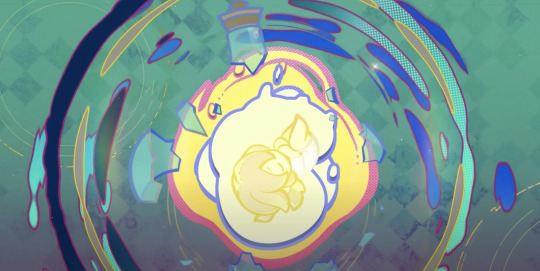
“One thought may end all calamity, and there will always be thoughts that may transcend time.” -The Meaning of Aeons
“Separate the dust in the flames with joy, and extract the exquisite from the crude. For all in the universe comes from a single source, and all things may be derived from a single thought.” -Cinnabar Spindle
I’ve been wanting to do some Rhinedottir speculations for a while. With the new Ancient Colors world quest in Fontaine, I think now is a good time to propose a theory about this mysterious member of the Hexenzirkel, her approach to alchemy, and the reason she is a “sinner,” especially within the context of one of the Archon Quest’s central questions: what does it mean to be “born with sin”?
SPOILERS: Up to Act II of the Fontaine AQ (just Primordial Sea stuff), and Ancient Colors.
Although Rhinedottir is never mentioned by name in Ancient Colors, all of the signs of her are there: Mamere’s identity as an artist, Elynas’ otherworldliness and similarities to Durin, and the differences between the Melusine’s perception of the world and our perception of it (or their aesthetics, which we will touch on later). Ancient Colors is trying to remind us of Dragonspine and, if you were playing during this time, Shadows Amidst Snowstorms, and I believe it is doing so because it is key to the secret of the Primordial Sea and the prophecy of Fontaine.
We’ve heard Rhinedottir’s perspective only twice so far, and that was in the Windblume festival from this last year and in Cinnabar Spindle’s lore. Though we still don’t know much about her, she does identify herself as a “mother” of many children, and that she is raising the only son she has left. This, of course, is Albedo.
We also know that she is considered a "sinner" at the center of the Cataclysm who unleashed "an army of shadowy monsters" onto Teyvat, but we have very little grasp of what exactly is meant by "sinner," and what if any consequences this label has had on her since then. Although every Hexenzirkel witch will undoubtedly be very important to uncovering the truth of Teyvat, Rhinedottir presents a particularly interesting case as the only one whose activities may have caused cataclysmic destruction, as opposed to Alice's general mischief and strange sense of humor.
It’s almost nothing to go off of, but I hope to demonstrate in this speculative theory that it’s more than enough to arrive at some answers.
Psychoanalysis 101, Round 2
To better explain what Durin, Elynas, and Rhinedottir’s other children are, we need to use an analogy rooted in Freud’s psychoanalytic theory of dream interpretation. This is a super TL;DR version of it and way oversimplified, but if you’re interested I wrote a more detailed theory about the significance of dreams in Genshin that has a full explanation of it there. (Also, it should be said that these were just Freud’s theories, please do not take any of the following as an accurate description of the human psyche and how it works. We are just having some fun for the sake of media analysis.)
Freud thought that dreams are the mind’s means of expressing unfulfilled wishes, and that the psychological purpose of dreaming is to “fulfill” those wishes. In A General Introduction to Psychoanalysis, he gives an example of this through a little girl’s dream where she was sailing on a lake: this dream was born out of an unfulfilled wish in her waking life, where she had to stop sailing on the lake despite wishing to continue. Hence, “I wish to sail on the lake” becomes “I am sailing on the lake” through the dream.
Further, Freud thought these unfulfilled wishes are “forgotten” in our unconscious mind when we are awake, censored by the ego to protect our conscious mind, but that at night this censorship is weakened. This is what allows a dream to occur while we sleep.
These unfulfilled wishes are often more complicated than a childish wish to keep sailing on a lake. Think about it this way: a wish is, at its core, a thought in our head, or a desire. What do we do with the thoughts we don’t like, the ones that are unbecoming of us or are unacceptable to fulfill?
We deny them.
Specifically, we repress them into the unconscious, where they are forgotten. Thing is, even if we temporarily forget these thoughts, they won’t just disappear from existence - they fester in the unconscious, waiting to be expressed. The dream, therefore, is the unfulfilled wish/repressed thought’s attempt to cross the boundary from the unconscious mind into the conscious mind - to be acknowledged, or indeed remembered.
“Unfulfilled Wishes”
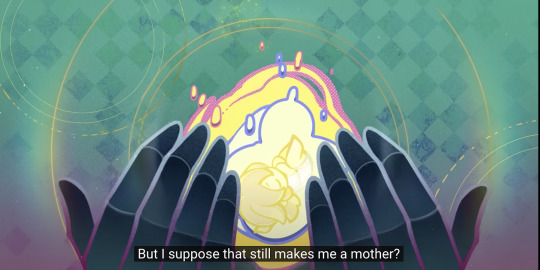
Making sense so far? If so, try to think of Teyvat like this: everything that is visible, everything above ground that the light touches and that can be perceived is like the ego and conscious mind. All of these things are what you’re aware of, things that you “know” and can make sense of, things that you understand, things that fit into rules and laws and order.
Now, think of everything in Genshin that is “unseen” and “unknown”: the Abyss, the spaces underground, forbidden knowledge, things that are “not from this world,” from beyond the firmament…these are like things from the unconscious mind, the repressed thoughts that we deny in ourselves because they may reveal a truth we are unwilling to face. These things are comparatively chaotic in nature, things we’d rather avoid, or things that we wish to forget.
We know that Elynas’ and Durin’s bodies are composed of matter that’s foreign to Teyvat, and that this is a major reason why they are incompatible with Teyvat and cause its destruction. This would make them more similar to a repressed thought, something that we don’t understand or know, and attempting to understand it destabilizes our sense of self, our “truth.” It follows that their home, the Abyss, is most similar to our unconscious mind, and Teyvat is most similar to our conscious mind.
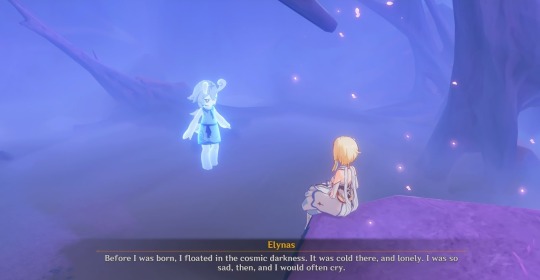
Elynas: Before I was born, I floated in the cosmic darkness. It was cold there, and lonely. I was so sad, then, and I would often cry.
So, as their mother, who or what is Rhinedottir in this analogy? Well, we can be a lot more specific than calling her a “sinner.” In fact, she’s a dreamer, and alchemy is the medium through which she “dreams”:
This was a story from long ago...
Unborn life, unfulfilled wishes,
Tragic dreams at the edge of the universal darkness that could never come true,
Indwell my body, and descend unto this world.
Then, my lovely children,
Like rainwater flowing into creeks, and plants growing towards the sun,
Go unto a lovely place, and display your own beauty there with pride.
This is a memory, a memory that a child named Durin had of his mother…
"Thank you, Mother, thank you."
"You gave me wings to soar and a mighty form."
"Mother, I wish to go to a land of lovely songs,"
"I will tell them about you, Mother, and about everyone else."
"I shall tell them that the place where I was born is beautiful."
-Festering Desire
Rhinedottir’s children, then, are like thoughts or ideas that she is bringing to life, or “making conscious,” by moving them from the Abyss to Teyvat. It may even be the reason why the sword from The Chalk Prince and the Dragon is called Festering Desire in the first place - it’s a reference to the idea of repressed thoughts, wishes, and desires festering in the unconscious.
Should the analogy hold true, it provides some insight into what her intentions may have been in creating her Abyssal dragons. But before that, we need to take a little detour into Enkanomiya and brush up on some lore.
Denouement of Sin
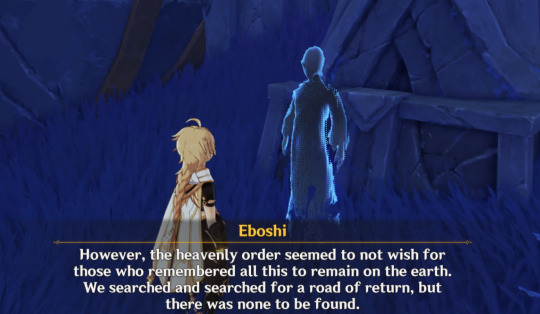
Eboshi: However, the heavenly order seemed to not wish for those who remembered all this to remain on the earth. We searched and searched for a road of return, but there was none to be found.
Remember these hologram-looking dudes? They are the Shades of Tokoyo, also known as Sinshades. They are described as afterimages of the former citizens of Byakuyakoku preserved by Istaroth’s favor, specifically those citizens’ most powerful emotions, and they are only visible during Evernight:
Eboshi: Due to the phenomenon known as Sinshades, the “past,” “history,” and “truth” of Enkanomiya would endure even if left to their own devices.
Eboshi: As such, great effort was expended, not that we might remember, but that we might “forget.” Lady Sangonomiya was of this view.
Like a dream, Sinshades only appear at night, and they are a kind of embodiment of history or “truth” that Watatsumi Island has chosen to forget, representing the thoughts and emotions of those who once lived in Enkanomiya. Using Freud’s theory of dream interpretation as a framework, Enkanomiya then functions as Watatsumi Island’s unconscious mind.
Put another way, if all Sinshades are the result of strong emotions preserved in time through Istaroth’s favor, then those emotions are like thoughts, and that would make the Sinshade a “physical” form or expression of those thoughts. So, when we call the afterimages the “Sins of Tokoyo,” we are in effect calling them the “Dreams of Tokoyo,” because they are the thoughts and emotions of Enkanomiya given form, and that’s what dreams do: they convey thoughts and feelings through a series of images.
Through the Sinshades, we see an implicit association with the concepts of dreaming and sinning in Genshin’s worldbuilding, and through them we understand that they are not so different from one another.
A Brief Note on Aesthetics
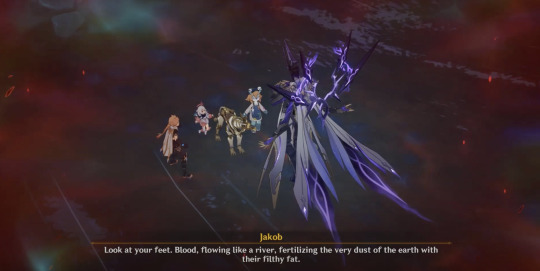
Jakob: Look at your feet. Blood, flowing like a river, fertilizing the very dust of the earth with their filthy fat.
It may have struck you how various Melusine perceive reality in a way that greatly differs from the things we see, as if at times their perception was “flipped,” if not somewhat strange. By the end of Ancient Colors, it’s clear that this is due to the Melusine being born of Elynas, who is not from this world. A similar phenomenon can be seen in both Durin and Elynas, the former imagining itself dancing with the people of Mondstadt before it “woke up” from this dream to Dvalin’s fangs in its neck, and the latter realizing that the things that it finds fun are destructive and harmful to the people of this world.
This is a part of the commentary present in several world quests and commissions in Fontaine that deal with “aesthetics,” or one’s own sense of beauty. Aesthetics are principles that differ on both large and small social scales, varying between groups of people and between individuals (see Salsa’s and Ubu’s aesthetic disagreement), and they can change throughout time as values change. In other words, they are informed by perspectives.
For example, think of what we know so far about the Primordial Sea. Neuvillette wonders how the Primordial Sea could be capable of giving life and then “suddenly reversing itself” so that it instead “devours life,” but this is just his judgment of what the sea does, and ultimately his perspective. Many others view the properties of the Primordial Sea differently from him: to them, the prophecy is comforting because it signals a “return,” or a “homecoming.” To take it a step further, Neuvillette may be making an assumption by stating that the sea has reversed itself. Perhaps this is just how the sea is, perhaps this is its “truth.”

Verenata: The "truth" will not be limited or constrained by the eyes and perspectives of the viewer, and won't be distorted by what is in their heart. It objectively exists, and it just is...like the white sand, like the bones of seastars, like the waves that crash and pound...those are "truth."
Now, imagine that you are staring at a 3D object from a 90 degree angle. If I ask you to describe the object from where you're standing, you'll be able to accurately tell me about what roughly half of the object looks like, but you won't be able to accurately describe the other half of it without help from someone standing on the other side of the object.
But how can you be sure there even is another side of the object, or that it's any different from the one you see now? From your perspective, what is already visible to you may seem sufficient to describe the object in its entirety. In other words, your perspective becomes your "truth."
It is only through considering additional perspectives that we broaden our own understanding of reality and expand on our "truth." However, broadening our perspective is usually not a comfortable experience, as is typical when we engage with ideas that differ from our own. Part of expanding our "truth" requires us to shatter our current understanding, pick up the pieces, and reassemble them into a shape that makes space for these other ideas and their "truth."
For example, when we confront Jakob at Elynas' heart, he describes the rushing currents beneath our feet as Elynas' blood. To the player, who has been swimming around in that for a couple of hours by that point, this idea is macabre and horrifying. However, when we consider Jakob’s perspective, his “truth,” it also expands our understanding of Elynas as a being that is somewhere between dead and alive, sleeping if you will, and that he is more than capable of waking up from his slumber with the appropriate stimulus. Another example is Canotila, who saw the wasteland in Rene's Book of Esoteric Revelations as a peaceful forest. When we consider Canotila's "truth," her aesthetic sense doesn't change the way we see the wasteland, but it does show us something equally important: the way that we experience the wasteland is not the only way it can be experienced.
If we return to the other ever-present metaphor of alchemy as a form of painting, we can see that Rhinedottir’s aesthetic sense greatly differs from what is acceptable and compatible with Teyvat. But, just like Mamere, she paints regardless of whether her paintings are understood by a greater audience. In time, Teyvat's "aesthetics" may change again, and perhaps her "art" will be received differently when that time comes.
Concluding Thoughts
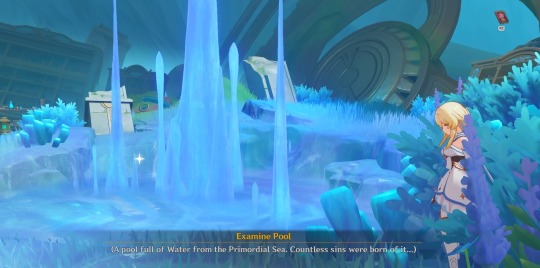
(A pool full of Water from the Primordial Sea. Countless sins were born of it…)
So, that is why I think Rhinedottir was deemed a sinner. She sinned by “dreaming” up these chaotic life forms that were not from this world, bringing them into being through the Art of Khemia, and telling those chaotic life forms that they were beautiful, too, that the ordered and lawful world of Teyvat just needed to realize how beautiful they were. Maybe Rhinedottir was dreaming of a new world, one where her children’s wishes could be fulfilled, where they could exist with everyone, and maybe creating that world required the destruction of this one. You could also think of her as someone who has introduced “external variables” into Teyvat, which, hmmm..:
“...No matter how many times I derive it, the result remains the same, though this result is not expected... Unlike the world depicted in these ancient texts, there will be no more new civilizations born... Unless we consider introducing "variables" from outside the system... If it was that sort of power, there might be a chance…” -Enigmatic Page I, Book of Esoteric Revelations
In this way, her “children” (thoughts) were all “born with sin,” or are born from sin (dreams). If Rhinedottir is a dreamer, then alchemy is the way that she dreams: it allows her to give forms to these thoughts. And if you buy that, then there are some serious implications to consider from this whole notion of Fontainians being “born with sin,” and just what exactly the Primordial Sea might be. Definitely something to think about while we wait for 4.1.
One last point that is more of an aside than anything else: Rhinedottir’s only remaining child is Albedo, but through this lens we see that he is not just the culmination of the Primordial Human Project, the creation of a human through the power of alchemy, but also the only known example of Rhinedottir’s “ideas” that coexists with Teyvat as it is now. As for her known extant grandchildren, they have integrated with Fontainian society and don’t seem to cause them any trouble. I wonder if she knew something like that could happen?
But…that’s just my take on it so far. What do you think?
(also, fun fact: there is a parallel storyline to this one unfolding in Honkai Star Rail right now as it relates to being deemed a “sinner” for creating life, and another parallel storyline in Honkai Impact 3rd about creation and rebirth and “returning home to the sea” and I just love when Hoyoverse connects their games like that)
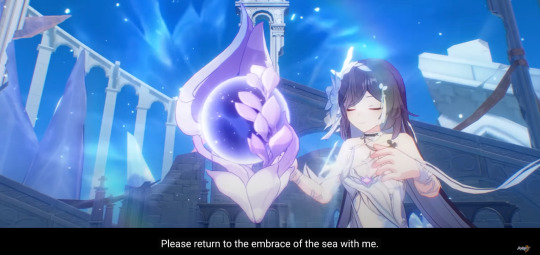
EDIT (9/8/2023): Touched this up a bit and made some grammatical corrections. Thesis is the same, some added support and re-phrasing was done to better convey it.
Sources
A General Introduction to Psychoanalysis by Sigmund Freud
#genshin impact#genshin lore#genshin impact lore#genshin theory#genshin meta#genshin impact meta#fontaine lore#rhinedottir#theory#elynas#durin#melusine#long post
229 notes
·
View notes
Text
Alhaitham and Neuvillette: Of Gentle Giants and Stoic Softies
⚠️Spoilers for Sumeru archon quests, as well as Fontaine archon quests acts 1 and 2 ahead. Read at your own discretion.
As a fan of Alhaitham since his initial appearance in the game (you may remember me from my "Alhaitham Propaganda" posts), I've found player reactions (as well as my own) to Neuvillette amusing to observe. Many aspects of their fan reception have been almost identical, owing to their strikingly similar mannerisms--both stoic, mysterious, and conventionally attractive, falling firmly under the "tall, dark, and handsome" archetype.
It's true that Alhaitham and Neuvillette are similar characters, both superficially and deeper down. However, they do exhibit some key differences in personality; in addition to resulting in subtle but distinct discrepancies of player opinion of these two characters, I believe this comparison makes it particularly intriguing to anticipate Neuvillette's further character development as the Fontaine lore expands and the story continues.
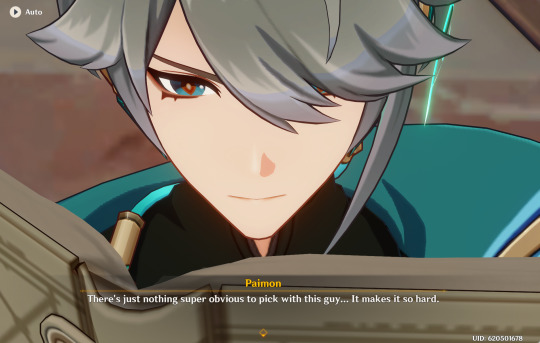
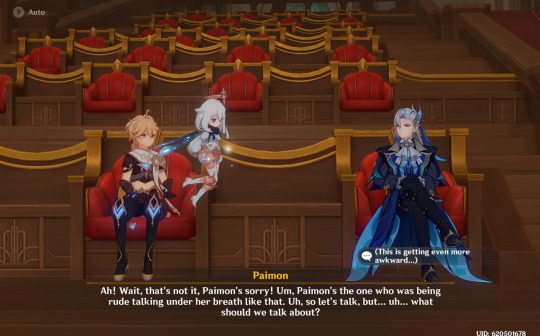
Alhaitham and Neuvillette both exhibit a blunted affect (also called flat affect), essentially meaning that they are not very expressive--at least, according to typical social expectations. However, this does not necessarily indicate that they don't feel emotions at all; in fact, it's possible to perceive and interpret their emotional cues, such as changes in facial expression or vocal tone, with relative ease, so long as they are not held to said social norms.
In real life, flat affect can either be simply a matter of personality, or a symptom of neurodivergent conditions such as autism, post-traumatic stress disorder (PTSD), or schizoid personality disorder (SzPD). People with blunted or flat affects are often misinterpreted as callous, hostile, or untrustworthy, or even completely emotionless, simply because their individual modes of expression do not match widely held social expectations.
This was certainly the case with Alhaitham, who, after a brief but impactful appearance in one act of the Sumeru archon quests, was almost invariably regarded by fans as highly suspicious, and commonly called a "walking red flag."
Moreover, several other characters' quotes about Alhaitham suggest that they think he is coldly rational and, according to Kaveh's opinion, has no feelings at all. While Alhaitham's extended collaboration with the Traveler ultimately proved that he was indeed a reliable ally, most other characters continue to regard him as entirely unapproachable.
Within canon, Neuvillette is also accused of being cold and apathetic. When Navia and the Traveler visit Neuvillette in his office to request records of a potential person of interest in the case regarding her late father, and come up empty-handed, Neuvillette verbally offers his sympathy; however, Navia, seized by grief, raises her voice against him for being dishonest and heartless. When Navia and company leave the palace, it is raining, indicating that Neuvillette--who is heavily implied to be the legendary Hydro Dragon by this point--was, in fact, genuinely moved to tears.

In contrast, though, beyond canon, cursory observation suggests that Neuvillette's reception by players has been largely positive, with fans readily describing him as "kind" and "sweet" despite his flat demeanor. The suspicion with which Alhaitham was met due to said demeanor appears all but absent.
Evidently, finding a potential reason for this difference requires delving deeper into their emotional patterns.
Indeed, in addition to being stoic, both Alhaitham and Neuvillette demonstrate sensitivity and openness to others' perspectives, integrity, and emotional experiences, which should accurately lend them both to the description of "sweet" or "compassionate." The Traveler's early interactions with them bear striking similarities: in the case of the Sumeru story, Alhaitham explicitly gives the Traveler the option to refuse to collaborate with him--which, historically, is highly unusual among suspiciously wealthy characters seeking a deal with the Traveler--and in Fontaine, Neuvillette's first conversation with the Traveler involve him apologizing for making the silence between them so awkward and offering to partake in conversation as a remedy.


What sets these two characters apart is their understanding of other peoples' emotional and rational processes--in Neuvillette's case, a lack thereof.
Alhaitham exhibits, through his words and actions in the Sumeru archon quests, at multiple points, a deep understanding of human emotions and thought patterns as phenomena that are at once predictable and volatile. He utilizes this understanding to forge trusting connections with strangers and to anticipate reactions of Akademiya personnel in order to infiltrate the House of Daena and overthrow the Grand Sage.
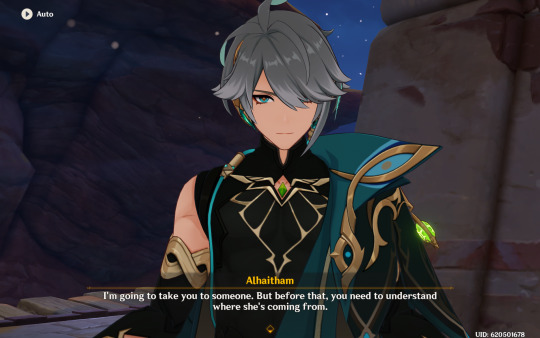

On the other hand, Neuvillette seems to lack a complete understanding of human emotional tendencies; whether this is due to a strongly held past misconception or simply naivete is still unclear. While Neuvillette is highly sensitive to other people's feelings in the moment once he becomes aware of them, he, unlike Alhaitham, acknowledges a personal failures to understand human thought processes and feelings in general, which forms the crux of his development as a character in the first two acts of the Fontaine archon quests as the true details of the Callas case come to light.
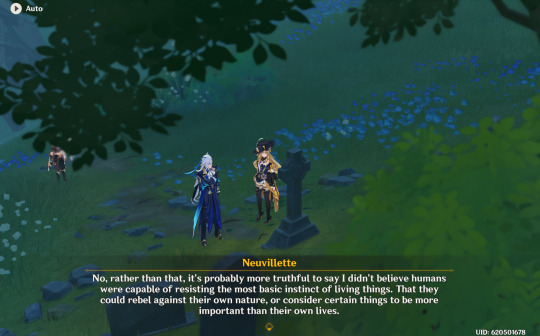
This is one aspect of Neuvillette's character that I believe contributes to his difference in fan reception from Alhaitham: inexperience and naivete are typically considered endearing traits, and, when paired with his blunted affect and seemingly permanent scowl, lend themselves to a sort of "gap moe"--perceived allure or "cuteness" stemming from a discrepancy in expectations of how a character should act based on their appearance, compared with how they actually behave.
Additionally, Neuvillette, despite his blunted affect, whether by virtue of profession or personality (likely both), appears to care a good deal about what others think of him, as suggested by his willingness to (attempt to) befriend, comfort, and reconcile with the Traveler and Navia.

As a result, Neuvillette's flat affect seems more superficially acceptable than in the case of Alhaitham, who vocally does not care at all about others' perceptions of him; Alhaitham's strong sense of self-preservation and self-assurance causes him to appear invulnerable, if not threatening, both within and beyond canon. He simply makes no attempt whatsoever to appear polite solely to appeal to social expectations. However, this is not due to a lack of kindness or compassion, as he, while highly logical and rational, by no means believes he is infallible, and readily apologizes to the Traveler upon recognizing that his actions were potentially harmful to them.

Still, the misperception of Alhaitham as a suspicious person is pervasive enough that other characters and fans alike hesitate to acknowledge him as an approachable and trustworthy person (a fact he canonically uses to his advantage to avoid "unnecessary social endeavors" and lead a peaceful life in which he largely keeps to himself).
Neuvillette might enjoy a similar luxury; his flat affect and intimidating demeanor are indeed practical in a court setting, where they amplify his authoritative presence. Like with Alhaitham, it only takes putting aside typical social expectations and getting to know him on a more individual level to understand that he is not as callous or hostile as he appears. Though the Fontaine story has yet to reveal whether this leads other characters to leave him alone in more mundane social settings, fan opinion of him certainly indicates that players have picked up on his compassionate tendencies due to quirks in his behavior, which was not more generally the case for Alhaitham, at least not until the Sumeru story had progressed much further.
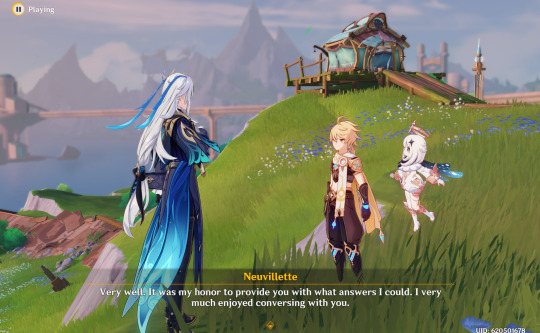
Given that flat affect should itself be, ideally, not considered a character flaw, and therefore should not be "cured," I'm intrigued to see where Neuvillette's character development goes as his character story, as well as that of Fontaine at large, continues to unfold. For example, Alhaitham grew visibly more comfortable with the Traveler's presence over the course of the story, expressing more personal and emotional vulnerability and even allowing the Traveler to enter his house. I'm curious to see whether Neuvillette will follow similar tendencies.
(I'm willing to bet that he will, given that Genshin Impact is a gacha game and characters are deliberately designed to have their own personal charms to make them appealing, but I can't claim to be able to predict exactly what will happen regardless.)
#genshin impact#genshin#genshin meta#alhaitham#neuvillette#genshin alhaitham#genshin neuvillette#al haitham#genshin al haitham#gi alhaitham#gi neuvillette
205 notes
·
View notes
Text
in MY opinion... i think that aside from being a diversion tactic (to make sure the fatui dont find out about the primordial sea), wrio threatening lyney could have also been him subtly checking on the dynamic between arlecchino and the house of the hearth orphans.
like wrio knows manipulative adults Pretty Well, and the fact that he knows the fatui sent orphaned "children" undercover instead of grown agents already tripped alarms in his head.
Wriothesley: Mr. Lyney, the cards are stacked against you right now. Miss Lynette is in my hands, and Mr. Freminet is still slowly being pickled out there in the brine. You know just as well as I that he cannot last out there forever.
Wriothesley: You need do but one thing to guarantee their safety. I would like you to contact your superior, and ideally invite her over for a cup of tea with me.
Lyney: You want to see "Father"? Ha, but why should she bother giving you an audience?
Wriothesley: Well, if she cares for the well-being of her dearest children, she should have plenty of motivation to join me for a parents' evening.
Wriothesley: I've heard that the bonds between the members of the House of the Hearth are like the bonds of family. I don't see why she would refuse.
(emphasis mine)
"call your parental figure or your siblings will be in danger" would be a relatively easy decision to make if your parental figure... yknow... cared about you. but lyney insists that arlecchino shouldn't be involved in this and breaks from the stress of possibly losing his siblings. which makes ME think like... how much value does arlecchino place in the orphans if lyney refuses to "trouble" her with possible imminent torture or DEATH.
Lyney: …Was this the extent of your master plan to get to "Father"? No matter how much pressure you may put on me, I won't allow you to use us to blackmail her.
Lyney: I… I shouldn't ask "Father" to do anything because of us…
(emphasis mine)
like... lyney... if she really cared about you she would willingly help you... you know...
and yes later on arlecchino is like Well he shouldve called me :/ but its way easier to say that after the fact.
The Knave: [...] It's unfortunate that Lyney's so eager to prove himself that he can't learn to rely on others... including me.
i mean lyney came to rely on the traveler pretty easily..? i think deep down he doesn't trust arlecchino.
so wrio noticed that something wasn't right pretty quickly, and could have also set this up as a sort of test - both for him, and for lyney - in a way - to take a better look at the dynamic between arlecchino and the siblings.
basically i think that specific part of the archon quest shows us that the house of hearth isn't a Found Family Despite All Odds situation and definitely has something much darker (aside from, you know. the orphans basically being FATUI AGENTS). i keep saying this but i think the fact that the previous head of the orphanage was "even worse" means that traumatized children/teens/young adults can easily justify a different kind of abuse as "well at least it isn't (x) which is even worse!" and based on the siblings' profile stories, it seems arlecchino leans more towards emotional manipulation/neglect, which, again, if compared to the physical abuse from the previous head, can be pretty easy to justify in the eyes of already traumatized and vulnerable people.
66 notes
·
View notes
Text
Inazuma’s post archon quest political status quo is absolutely the funniest out of all the nation the Traveller has visited so far. The thing about power is that is a social phenomenon and not a natural one. The exercise of power is entirely dependent upon the perception of legitimacy. The edicts of rulers who are perceived as legitimate will fall on deaf ears as the masses feel no reason to obey them. Inazuma’s civil war was a crisis of legitimacy provoked by a ruler stepping beyond the bounds of what the people were willing to accept as legitimate rule. Its resolution saw the reversal of the illegitimate edicts as well as the removal from power of all those who enabled them with the exception of the Shōgun. In practical terms, peace is made possible not by the restoration of the Shōgun’s legitimacy but rather by the dissolution of the power structures that enabled the Shogunate to act in illegitimate ways. The Kujou clan is in disarray and soon to be replaced within the Tenryou Commission, the Hiiragi clan is likewise on unsure footing (made worse by the possibility of Hiiragi Chisato marrying into the Kujou clan), and the Shōgun herself has proved herself to be not only fallible but easily manipulated by bad actors. Thus, the peace is not being made on the Shogunate’s terms, but rather on the rebels’.
The Yashiro Commission is the only organ of the Shogunate that has escaped from the chaos with its legitimacy intact and it has continually bolstered its legitimacy by holding festival. With the backing of the Grand Narukami Shrine, the Commission is likely the most trusted and well regarded institution in the nation. Additionally, they have a tacit alliance with Watatsumi Island, whose forces still occupy Yashiori Island and have yet to be demobilized. Whether Ei realizes it or not, it is unlikely that she has the power to govern Inazuma without the support of the Yashiro Commission, the Grand Narukami Shrine, and Watatsumi Island. In fact, what little legitimacy she retains resides entirely within her capacity as the Narukami Ogosho, the traditional deity of Inazuma, and not within her capacity as Shōgun. While on paper, the Shōgun remains the ruler of Inazuma, in practice it seems that the exercise of power is likely to require the tacit assent of the Yashiro Commission in order to be perceived as legitimate. Should the Shogunate act in an illegitimate way, the Sangonomiya troops remain in a position to intervene. Further, (and no one seems to talk about this??) the Yashiro Commission purposely stayed out of the fighting, which means that the Kamisato clan has a completely unbloodied armed force that could easily march into Inazuma City should the need arise. It’s even possible that the Yashiro Commission has more troops on Narukami Island than the Tenryou Commission, as the latter have yet to decamp from their fort in Kannazuka.
This means that the status quo is such that the exercise of power in Inazuma requires the tacit consent of a five-hundred year old fox whose main motivation is the desire to alleviate her boredom and the cunning bobba slurping homosexual with whom she has a potent rivalry. Further, their de facto rule is guaranteed by an autistic fish priestess whose special interest is winning wars and her battle hardened guerrilla army. And strangest of all, this seems to be working out perfectly fine for everyone. Resistance to the new regime is minimal as the Tenryou Commission has proved to be more loyal to Kujou Sara than the Kujou clan and the Kanjou Commission is entirely too weak to mount any resistance to the combined might of the Tenryou, Yashiro, and Sangonomiya forces. Of course, it helps that Ei has seemingly no interest in directly intervening in anything but Inazuma’s weather and the odd Genius Invocation Tournament.
109 notes
·
View notes
Text
"i'm not sure exactly when it began. but a prophecy has begun circulating around fontaine...the people will all be dissolved into the waters, and only the hydro archon will remain, weeping on her throne."
HELLO??? WE ALREADY HAD A BAPTISM PARALLEL IN THE TEASER AND NOW THIS??
YOU KNOW WHAT THIS SOUNDS LIKE???
NOAH'S FLOOD. WHEN GOD SAW THE SIN PREVALENT ON THE EARTH AND THOUGHT IT BETTER TO START OVER-
-EXACTLY WHAT CELESTIA TRIED TO DO WITH KHAENR'IAH.
#genshin impact#genshin#fontaine#genshin 4.0#as light rain falls without reason#genshin meta#genshin theory#i'm p much liveblogging this so i'll follow up if something indicates otherwise#furina#focalors#genshin livestream#genshin impact version 4.0
118 notes
·
View notes
Text
Childe, Scaramouche, Fischl, and Furina.
Boys with Delusions and girls with delusions.
#genshin team#genshin impact#genshin meta#genshin memes#childe#scaramouche#fischl#furina#probably bad genshin teams#genshin anti meta
65 notes
·
View notes
Text
personally i don't think kaeya ever took the ragnvindr last name and i don't think he would've wanted to. being accepted as part of the family and loved by them was already more than he expected and i don't think he would've felt a clear conscience taking their last name. it would've already been hard to allow himself to feel okay accepting the love they extended and the friendship he had with diluc, built on top of a lie of omission.
his talk with dainsleif also made me think he clearly kept his last name as an important attachment and reminder of his family, even if he doesn't know them anymore. he knew them last as a child, so his view is limited but i think it's important that taking sides isn't so simple that he'd easily be able to take on a new name/leave behind his heritage. his character arc seems to be about trying to defy fate, find a path where he can love both places/people/families without having to choose one. this would go along with the themes around teyvat of fate and deceiving or changing fate
129 notes
·
View notes
Text
An example of queercoding in Alhaitham and Kaveh's relationship: Madam Faruzan edition
Due to the rules in place for game development in China, the possibility for queer confirmation within Genshin Impact is denied, which therefore renders the usage of characters alluding to the potential romantic connection between two same-sex characters as impossible. However, the same insinuation can be made by omitting specific language which strictly conveys romantic sentiments, such as ‘couple’. Instead, the idea of secrecy or something unmentionable can be drawn upon as indicators, as this draws parallels to the taboo of homosexuality practiced within certain cultures and media forms, which the real world audience can identify.
For example, Alhaitham and Kaveh as secret housemates. This can be used to convey an idea of ‘taboo’ as Kaveh desires to protect his reputation by concealing his shame of having to live with Alhaitham. In-game, the context here is that Kaveh wants to uphold his reputation of a successful architect, but within Alhaitham’s Story Quest, upon the player’s discovery of Kaveh living with Alhaitham, this context is omitted for some time. This prompts Paimon to question what exactly Alhaitham and Kaveh’s relationship is, with Kaveh denying that the two used to be friends but are not anymore: “I wouldn’t say ‘friends’ exactly”.
This tactic of double entendre can be seen again in A Parade of Providence when Paimon almost reveals Kaveh’s living situation to Faruzan.

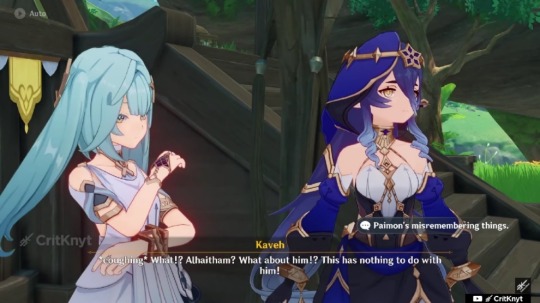
Faruzan’s can be observed to resort to a thinking pose, in comparison with Layla, when Alhaitham is mentioned in relation to Kaveh wanting to buy property, as Paimon almost ‘outs’ the truth, that Kaveh resides with Alhaitham.
She then seemingly dwells upon the subject, as she returns to it after Kaveh requests for a change of topic later in the conversation. Here, Faruzan follows up on whether Kaveh lives alone, which he fails to deny.
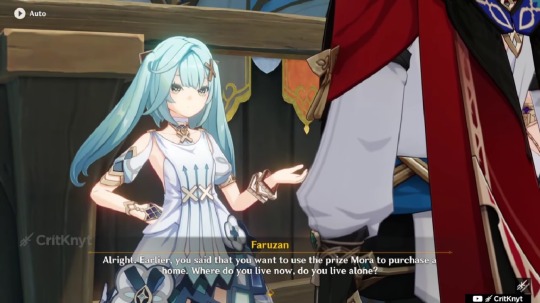
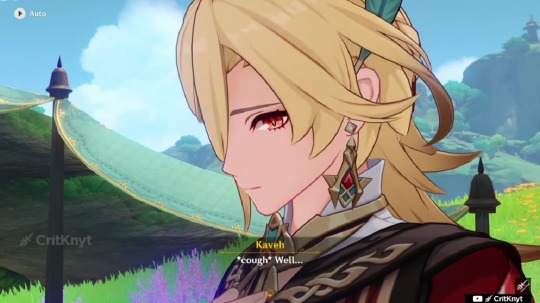
Here, it can be seen that she has already began associating Kaveh and Alhaitham, possibly speculating that the two live together. When Kaveh fails to supply an answer, therefore not denying her theory, she explicitly ties the two together, and asks if the two are “hiding” something.
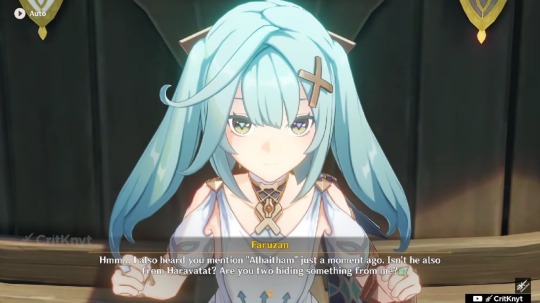
This question evokes a physical reaction from Kaveh, as he denies this question out of fear of being revealed, with Paimon opting to leave in order to cover her role in revealing Kaveh’s predicament.
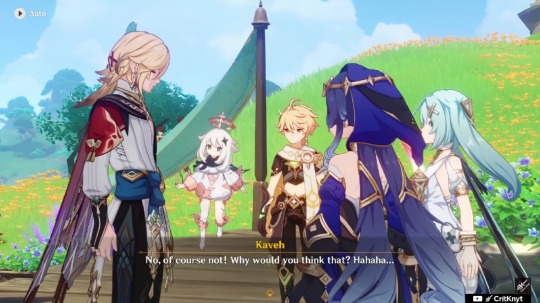

A deliberate potentiality has been created here in regard to what Faruzan has inferred, as her phrasing of “are you two hiding something from me?” is non-specific. Rather than asking: “are you two living together?”, she asks a question which holds multiple connotations. Due to the ambiguity of her meaning, her question can be observed as a non-explicit version of the: “are you two a couple?” question.
On the surface, this question is a reference to their situation as roommates, however, her phrasing is non-specific, and hints to another cause for “hiding” something. For Faruzan, Kaveh’s blatant evasion of the topic and dismissal of Alhaitham’s name, could easily be inferred as “hiding” a romantic connection – which is something that the player, too, can pick up on from her gesture of suspicion, her inquisitive questioning, and her excitement when piecing together the clues. The ambiguity of her question generates multiple meanings as to why she has surmised the two could be “hiding”.
This overt secrecy in Kaveh’s living with Alhaitham, another man, prompts the player to generate associations between this in-game secrecy and real world queer shame. In this, there is an implication of the need for Kaveh to confirm the status of his relationship between him and Alhaitham. Not only does this scene connotate an ‘outing’, in which a queer character has their queerness forcibly revealed to a heteronormative audience, but this creates a sense of secrecy, which, again, can be interpreted by the player as ‘taboo’.
Kaveh does not want to tell anyone of his living situation out of preserving his stellar reputation, however, Faruzan is missing this context. She relates Alhaitham and Kaveh together in the phrasing “you two”, coupling them together in a secret that they “hid[e]”. The player understands this as indicating to their living situation, however, this creates a separate context which Faruzan has interpreted and that, we, as the audience are not privy to, but can interpret based on her allusions to cohabitation between two men being a secret.
Whilst this is not explicitly romantic within Genshin’s world of nameless sexuality, Faruzan’s ambiguous questioning here draws parallels between real world understanding of sexuality and the connotations of queerness which stems from two men living together in secret.
(Update: For more analyses like this, the essay this is taken from is now uploaded! It can be accessed here and here as as a pdf <3)
#faruzan needs to run away from these two im so sorry you dont deserve this#queercoding is alive and real in genshin impact#but we already knew that#the fact that alhaitham and kaveh are roommates but in secret is already extremely telling#and it's stressed that they are ROOMMATES and not landlord/tenant#this is just one example of queercoding from the queercoding section of the essay but i was going insane over it#i really recommend watching this particular part of a parade of providence because the stills of the animations dont do it justice#also why did faruzan react like THAT#that was not a normal reaction to have if you find out two colleagues platonically live together#the writing genshin is crazy#lets all be crazy together <3#haikaveh#kavehtham#kavetham#alhaitham#kaveh#haikaveh meta#genshin meta
179 notes
·
View notes
Text
Assuming that Vision bearers can all dive indefinitely in Fontaine (the same way they can withstand the Withering and the Chasm's corruption better than most)...
#furina#focalors#genshin impact#masquerade of the guilty#genshin meta#silly headcanons#polls#genshin impact spoilers#fontaine spoilers#meta: pinned posts#reblogs appreciated!
115 notes
·
View notes
Text
Fontaine has an interesting theme about social media and influencers.
When you first arrive, you come across some people talking about a real court case as if it's a play, reveling in the dramatics of it instead of treating it as a real court case with real consequences. Social media has started to blur what is serious with entertainment- people's private or embarrasing moments are put on blast on youtube or tiktok or wherever so someone can laugh or feel sad for five seconds. People judging someone's entire personality and telling people what they should do in a situation based on one story they weren't even there for (ex. reddit, especially AITA but plenty of other places), "mommy bloggers" using their children as content.
The courthouse is also the opera house, and with all the drama in the several court cases we've been in, it seems that the real winner (at least to the audience) is making your point in the most dramatic way possible rather than actually being innocent of the crime. This is often how internet drama plays out- whoever makes the first accusation and/or the most wild one is the "winner", in terms of attention. We try and present evidence in ways that will sway the audience's reaction, and the scales literally tip one way or another based on reactions.
Furina is a major influencer on this topic. She is often in the courthouse, and well known to take an interest in the cases. When we arrive, she immediately shows up dramatically to accuse us of a made up crime, attempting to create another trial for her to take part in to use for the drama. Lyney gets us out of it, but it immediately sets up her character for the rest of the story.
The 4.2 archon quest has the segment where we see where Furina first came to be. She is told she must play the part of an archon, no matter what. No one can know she isn't, she must live up to everyone's expectations of an archon. She then introduces herself to a crowd, slightly nervous, trying to be herself. The crowd jeers, saying something similar to "THIS is an archon?" She then tries again, putting on a more confident and decisive front, saying, "see? that was just a test! I, the archon, am glad you didn't fall for it."
She tries to be herself, but the expectations and jeers from the public encourage her to put on a false front to fit their idea of an archon.
I have watched this happen many, many times to people i have followed- whether bloggers, youtubers, streamers, etc; they often start off a bit rough around the edges, but genuine and enthusiastic, and then they get more popular and cater what they make to whatever trends are in right now, with more sponsors, less niche content, more polished and more similar to every other creator.
Furina seems a great example of how the expectations of social media/ the public's judgement of how you should be will end up pushing people into playing a part that burns you out and makes you feel hollow.
59 notes
·
View notes
Text
[3.8] Technology as a False God: On "Evolution," the Duality of Machines, Replication, and Wisdom
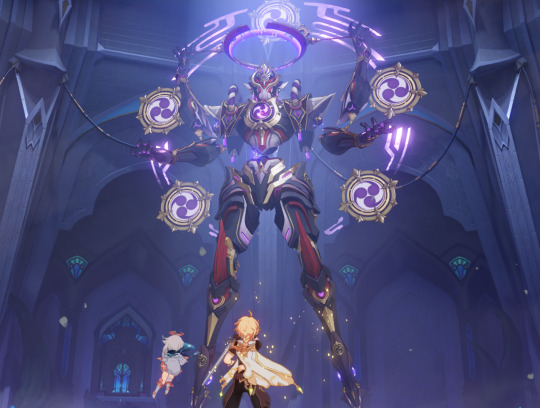
“To recognize untruth as a condition of life: that is certainly to impugn the traditional ideas of value in a dangerous manner, and a philosophy which ventures to do so, has thereby alone placed itself beyond good and evil.” –Friedrich Nietzsche, Beyond Good and Evil
Before we move on to the nation of justice, I want to do one last inquiry into the narrative significance of machines and technology in Genshin’s 3.x patch cycle. Here, I’ll discuss how divinity (or “godhood”) and technology are treated as interchangeable tools to surpass fate and the boundaries of mortality, the potential problems with treating them this way, and propose an alternative relationship between humanity and technology as illustrated through Karkata, Benben, Tamimi, and Mehrak. By foregrounding machines, we learn something intriguing about ourselves and the “truth” of this world as we perceive it.
SPOILERS: All Sumeru Archon Quests, Caribert, the Golden Slumber and one out-of-context screenshot from Dual Evidence, the Dirge of Bilqis and its post-quests, Khvarena of Good and Evil, Nahida’s second Story Quest, Faruzan’s hangout, an out-of-context screenshot from Baizhu’s Story Quest, and major spoilers for Persona 5 strikers at the end. Also some dialogue from Shadows Amidst Snowstorms and A Parade of Providence, two limited-time events from 2.3 and 3.6 respectively.
Disclaimer: I have tried my best to write this post so that it stands on its own, but because it is still a sequel it will probably make the most sense with the context of part 1. Here are the previous posts leading up to this one:
Part 0: On Dreams, the Abyss, Forbidden Knowledge, and Wish Fulfillment
Part 1: The Uncanny, Fate and the Machine
Terminology:
Machine is sometimes used interchangeably with “technology” in this post.
Technology or tool here is referring to technologies specifically used to pursue a wish like immortality in the face of existential dread, not the use of technology or medicine (which I do not address here, and is very difficult to separate from the former) to facilitate someone’s life who could otherwise not survive without that technology, or would have a more painful lived experience without it.
Also, though I don’t engage directly with “A Cyborg Manifesto” here, Donna Haraway’s ideas have greatly influenced my own over the years since I read her in college (although I mostly disagree with her on many points, or at least don’t go as far in boundary deconstruction as she does). I owe my interest in technology studies to her and that piece. Her essay is linked here and at the bottom if you would like to read it.
(and finally with many, many, many thanks to my boyfriend for multiple beta reads despite not having played a single Hoyoverse game, helping me work out the philosophy bits and contextualizing them in history, and encouraging me to finish this)
TL;DR: Machines are friends, not food!
No Matter the Cost
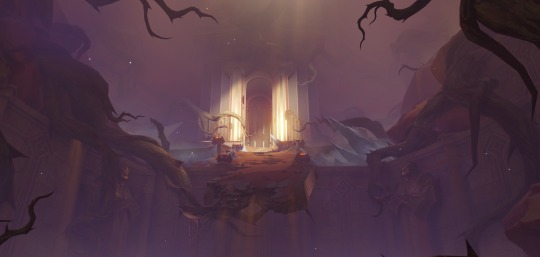
“...Perhaps it is as the notebook says, and we can find a power that transcends even that of the Abyss — the power of ‘evolution’...” -Records of Unknown Attribution (I)
“Life, death... and the world around us all follow a set of laws... Hehe, but if you never test the limits, how can anyone know where the boundaries of these laws are?” -Baizhu Voicelines, Chat: Natural Laws
“...Even the ominous thing that came down from the heavens shall be ours to use…” -Hyglacg, Shadowy Husk in the Chasm
Without a doubt, the star of this patch cycle is Khaenri’ah, which lurked in subtext and allegory in the Archon Quest, haunted Sumeru’s landscape with its massive defunct Ruin Golems, and finally smacked us in the face with its physical location in Khvarena of Good and Evil..
We already know that Khaenri’ah was a nation that put its faith not in the gods but rather in human ingenuity and technology, and that they ultimately attained a power so great that they “almost touched the dome of the firmament.” They did this by researching increasingly dangerous energy sources for their numerous mechanical creations, the Ruin Machines we are all too familiar with by now. They started out with Azosite, a Ley Line-based elemental energy source that powered their earliest Ruin Guard models, like those scattered around Devantaka Mountain.

Nasejuna: This giant furnace is used to make a substance known as Azosite. It is the core of this entire factory, and the Energy Blocks we saw earlier were derived from this place.
But this energy source proved inefficient and therefore inadequate for Khaenri’ah’s goals, which led them to seek a higher power from beyond the skies that could fuel their larger machines with perpetual energy. This likely is the bridge between Khaenri’ah’s fate and Chlothar’s mysterious remarks in Caribert about the Abyss Sibling:
Chlothar: We once believed that you would bring new strength and hope to Khaenri'ah.
Chlothar: To us, you were the Abyss... A wondrous mystery far beyond our imagination and comprehension...
Chlothar: ...And the one who controls the Abyss can control everything!
Chlothar: We yearned for that future. We looked to you to take us there.
Chlothar: But what did you bring us instead?
Though Khaenri’ah presents itself proudly as a godless nation, it may have been founded around the time when the celestial nails dropped in Teyvat’s first forbidden knowledge pollution event, which destroyed the unified human civilization. As potential survivors of this devastating act by the Primordial One, Khaenri’ahns then settled in a lifeless land without plants or animals of its own, and they hoped to build something there that belonged solely to humanity. The Heavenly Principles had turned on the world’s earliest humans, and they were powerless against them. Chlothar’s words betray the scars of this trauma on Khaenri’ah, as well as their desperation to control their fate by looking to the Abyss.
As a brief refresher from the previous part, we discussed how the German word heimlich denotes “the home,” all that is familiar and known, while unheimlich (uncanny) refers to all that is unfamiliar and external to the home, such as the wilderness. The Abyss sibling and the Traveler are external variables to Teyvat, making them otherworldly, unfamiliar entities full of potential to surpass Teyvat’s natural laws. Although the Abyss sibling is not a god per se, they were probably as close to a god as Khaenri’ah ever had, because to them the sibling embodied the higher power they were searching for, and they saw that “godliness,” a sort of functional divinity, was yet another technology for them to master. In this way, the Abyss sibling (and their functional divinity) was a powerful tool for Khaenri’ah’s desired end, the “future they yearned for,” a being who could deliver them to the end of their suffering under the Heavenly Principles.
It’s similar to what King Deshret represented to Rahman and the radicals in Archon Quest. The hopelessness of Sumeru’s situation before the Archon Quest’s conclusion is an allegory for the position humanity finds itself in under the rule of the Heavenly Principles, with the Akademiya symbolizing Celestia and the desert dwellers symbolizing Khaenri’ah. The material consequences of the Akademiya’s rule on their lives created a dangerous situation for the desert, and those most desperate to change their fate were willing to believe in the impossible:
Dehya: …The rougher life gets, the more they wanna believe in King Deshret. Way they see it, King Deshret’s resurrection is their only chance at overthrowing the Akademiya.
…
Dehya: Sumeru is run by wise and mighty sages. To them, us desert dwellers are nothing but tools that can be used and discarded at their whim.
Dehya: We’re cheap labor. Like livestock, but easier to control…Nothing more.
…
Rahman: We’ve waited a long time for this day to come… The sun and the moon no longer shine here. All you see now is cracks in this desiccated land. But, fate has finally dealt me a hand to play against the Akademiya.
Rahman: With these scholars in our custody, we’ll stomp the Akademiya’s forces and fight our way beyond the Wall of Samiel.
Like the Abyss sibling, Deshret’s divinity is both a nebulous symbol of hope and also the means to an end, a tool or “technology” for surpassing fate.
Celestia is untouchable, unconcerned with mortal lives, and the boundaries that govern humanity leave no room for them to negotiate their rule:
"Resolve, valor, love, hate...they will all twist in the river of time. But the 'rules' will never change." –Magatsu Mitake Narukami no Mikoto, Living Beings
Instead of bowing to Teyvat’s laws, Khaenri’ah pushed them to their limits. The cost of their failure spelled the end of their nation as they knew it, polluting Khaenri’ah and Teyvat with forbidden knowledge again.
And speaking of forbidden knowledge pollution, let’s talk about Apep’s role in Nahida’s second story quest, because if all that wasn’t enough, the metaphor becomes quite literal in Apep’s case. Nahida’s second story quest is many things, all of which will be extremely important in Fontaine when we deal more directly with the idea of forms, the Self, and mirror images, but its most useful application to both Sumeru’s story and the overarching main story is the allegory of Apep swallowing Deshret.
In exchange for allowing him to establish his kingdom in the desert, Deshret promised to pass all of the knowledge he learned to Apep once he died. When that day did come, Apep literally ate Deshret’s body in order to assimilate his knowledge (or memories) into its body. Little did Apep know, this was all Just As Deshret Planned, and its body became a containment zone for the lethal forbidden knowledge he accumulated after the Goddess of Flowers’ death.
Apep’s goal was, and still is, to overthrow the Heavenly Principles that took Teyvat from it and the other Sovereign dragons, and using Deshret’s knowledge was yet another stepping stone to achieving this goal. Seems a little similar to Khaenri’ah, right? It’s even in the title of its boss music: “God-Devouring Mania.” This idea of not just utilizing divinity as a tool, but also metaphorically consuming it as an energy source, like a predator would consume its prey, is crucial to understanding its purpose as an aid in a larger project of “evolution.” (Edit: in other words, it’s all about power).
Drink Not That Bitter Salt Water
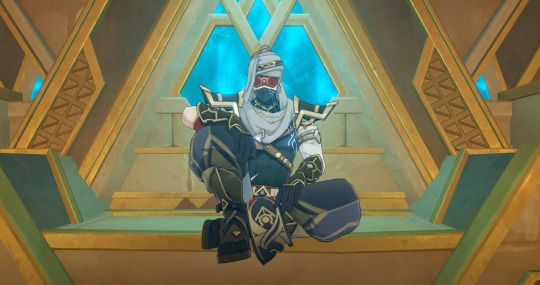
“Flesh decays, and with it decay all martial arts mastery and all poignant memories. Perhaps only by converting one’s four limbs and body into sturdy mechanical parts, and by at last sacrificing one’s very own heart for a sophisticated mechanical one, can one transcend the impermanence of the fleshly form…” -Marionette Core Item Description
“A reptile that has mutated after feeding from greater lifeforms.
Majestic beasts are sometimes revered by human beings as the embodiment of a greater power, their visages turned to analogy to feed in reference to a person, feeding their ego. However, the majority of beasts that have absorbed the "greater power" were slain by the overwhelming nature of the power itself. Only a few among their number evolved new forms.” -Consecrated Horned Crocodile, Living Beings
Video still from WoW Quests
As it turns out, the relationship between divinity and technology to humanity is not just unidirectional, but interchangeable. Let me show you what I mean.
In the Golden Slumber world quest, the Traveler wanders through the ruins of King Deshret’s civilization in search of a novel area of research for Tirzad’s paper with Jebrael and Jeht, two members of Tirzad’s hired investigation team. In the depths of King Deshret’s mausoleum, they stumble upon Samail, who is collaborating with the Fatui to locate King Deshret’s secret, the Golden Slumber.
At the conclusion, Jebrael and Samail actually reach that “place” after arriving at Deshret’s throne in Khaj-Nisut. In order to save Jeht, Tirzad, and the Traveler from the encroaching Golden Dream, Jebrael joins Samail in the sea of consciousness:
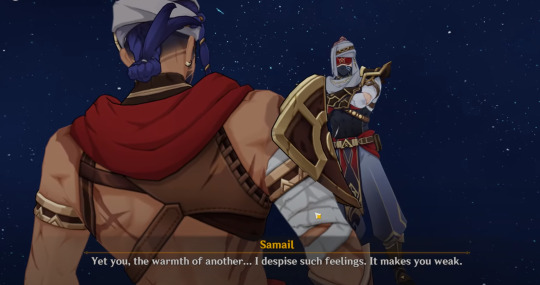
Jebrael: I'm inside... the Golden Slumber promised by Al-Ahmar?
Samail: Oh... You are not "us" yet.
Samail: ...It's fine. Soon, there'll be no "you." "You" will become a part of "us." This meaningless talk will be unnecessary then.
…
Samail: You should obey. Al-Ahmar's will is our will. The Thutmose's dreams are our dreams.
Jebrael: No! Ufairah taught me that I'm not just some part of you, I'm an independent person! I have my own dreams... I won't go back!
Samail: Jebrael, why don't you understand? Love is just a fever. I even eliminated the infection for you. Has the heat made you lose your mind?
Jebrael: You're the one who's lost their mind, Samail, not me. The Golden Slumber that Al-Ahmar promised us isn't like this... It's not a sad place with only "we" and no "I."
Samail: I'm not sad. I know what I want. My dream is to be one with the Thutmose.
Samail: Yet you, the warmth of another... I despise such feelings. It makes you weak.
Video still from WoW Quests
When they worked under Babel, Jebrael saved Samail from an assassin Babel sent in their exploration of Gurabad. Classified as traitors of the Tanit, Samail and Jebrael then founded the Thutmose Eremite faction together and were the only meaningful connection each other had until their first attempt to uncover Deshret’s secrets. On this expedition, Jebrael met Ufairah and had their daughter Jeht together, further pulling him away from the Thutmose and from Samail. Samail then kills Ufairah in one final attempt to make Jebrael stay, but even this is not enough, and Samail fails to “possess” him in the end.
Samail’s loneliness and despair then drove him further toward the Golden Slumber of his dreams, where he would never truly be alone again. He resents Jebrael’s attachments to the material world and likens them to an illness because these attachments are what make him an individual and prevent him from returning “home.”
It doesn’t really matter to Samail what King Deshret’s original intent for the Golden Slumber was, because he needed to appropriate the project for his own subconscious wish, his own intent to transcend his flesh and become “one” with his departed god’s dream, indeed to merge with Deshret himself. If rationalizing this wish required confounding it with Deshret’s, so be it. With the Golden Slumber’s technology, he could consume everyone and everything.
Rahman and the radicals relied on both the technology that (falsely) promised Deshret’s resurrection and Deshret himself to deliver them a brighter future, but here Deshret and his technology are more difficult to separate from one another. His divinity is technology in this sense, and using that technology allowed Samail to surpass the boundaries normally imposed on mortals. Though his and Jebrael’s bodies died in the material world, their consciousness is now infinite in the Golden Slumber.
Babel’s motives in the Dirge of Bilqis were also quite similar to Samail’s. After opening the path to the Eternal Oasis, her true intentions to monopolize the oasis and overthrow the Akademiya came to the surface:
Babel: Whether she is alive or dead, whether she can or cannot be resurrected... As long as the Eternal Oasis is under my control, all such things will be mine to decide.
Babel: I shall be the sole Prophetess of the slumbering goddess, the Tanit's law shall be divine edict, and the prosperity of the Tanit shall be the pre-ordinance of her divine oracles.
In the Golden Slumber and the Dirge of Bilqis, the focus shifts from what a god can offer humanity to what their technology alone can offer. Though this distinction is subtle, it is important for solidifying that technology is not only a tool humans use to appropriate divinity, but that it is also seen as a form of divinity itself. What Babel and Samail hope for is not to resurrect a god or to create one, but in effect to become a god through their use of technology. To humanity, divinity is a technology, and in technology it sees divinity.
God Devouring and Rheingold* Gathering
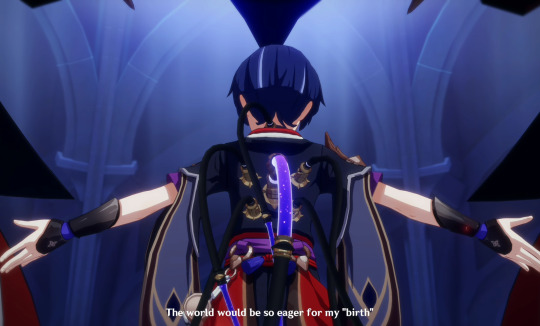
“An arthropod that has mutated after feeding from greater lifeforms. Lifeforms are governed by the laws of evolution, Consecrated Beasts exploited these rules by being fortunate enough to discover a long-dead carcass of a greater being before any of their competition ever did. Animals and humans often have far more in common than the latter is willing to acknowledge.” -Consecrated Scorpion, Living Beings
“...Zandik and I discussed the traits of local plants and animals. We also exchanged views on their evolution models. We had a great time and decided to go on a picnic tonight…” -Sohreh’s Note
So, why machines? Why is technology the vehicle of choice to consume divinity?
To start off, machines present a fascinating ontological dilemma for humans. Let’s begin with the first problem they pose.
Although there are many ways to embody a human experience, what all humans have in common is a finite lifespan. The impermanence of life, and our awareness of that impermanence, is central to the existential question of the meaning of our existence. In our attempts to locate that meaning, some turned inward and asked: what makes humans different? And Cartesian dualism answered: humans are different because we have an immaterial soul that allows us to reason.
However, in L’Homme Machine (Man a Machine), French materialist and ex-physician Julien Offray de La Mettrie posited another theory of the body that ran counter to this narrative. Very generally speaking, materialism is the philosophical view that all phenomena are a result of matter and material interactions. To materialists, matter is the fundamental nature of reality itself – if it is not composed of matter, it doesn’t exist. He not only saw the body and soul as one and the same (what philosophers call monism), but also as analogous to a machine, a view that Descartes reserved only for non-human animals. In other words, Descartes argued that thought originates in an immaterial “mind,” while de La Mettrie reasoned that we think through our bodies, and that this makes us no different from other animals or a machine.
Though his examples weren’t especially scientific, the move to extend Descartes’ analogy back to humans is upsetting to some due to the lack of privilege it affords the human subject. If a human is no different from other animals, if there is no immaterial soul or “mind” that distinguishes us from them, then what makes humans special at all? In de La Mettrie’s words:
“We are veritable moles in the field of nature; we achieve little more than the mole’s journey and it is our pride which prescribes limits to the limitless. We are in the position of a watch that should say (a writer of fables would make the watch a hero in a silly tale): ‘I was never made by that fool of a workman, I who divide time, who mark so exactly the course of the sun, who repeat aloud the hours which I mark! No! that is impossible!’ In the same way, we disdain, ungrateful wretches that we are, this common mother of all kingdoms, as the chemists say. We imagine, or rather we infer, a cause superior to that to which we owe all, and which truly has wrought all things in an inconceivable fashion (de La Mettrie, 146).”
This “uniformity of nature” (de La Mettrie, 145) has a horrific quality to humans. We assert that we are better than what has created us, that we are superior to other animals, in order to repress the despair of a meaningless existence. It is in no small part what motivates Scaramouche to offer his mechanical body as a test subject in the god creation project, so that he too could attain his destiny:
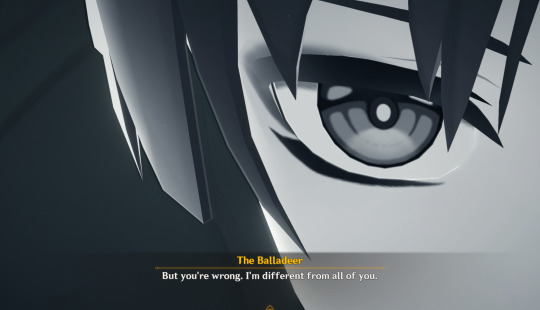
The Balladeer: But you're wrong. I'm different from all of you.
The Balladeer: I was born to become a god. My entire life up until this point has just been a meaningless routine.
The Balladeer: Just think about a sheet of paper... By itself, it holds no meaning. The content recorded on it is what gives it value.
The Balladeer: All "I" had recorded down before were some painful memories and boring human feelings. Such senseless drivel should have been erased a long time ago.
This brings us to the second problem. In 1970, roboticist Masahiro Mori proposed a curve to measure the “affinity” we feel while gazing upon increasingly humanoid machines. He placed industrial robots at the beginning of the affinity curve and a healthy person at the end to demarcate a continuum of similarity between the machine and a human’s appearance. Near the end of the curve, our affinity for machines suddenly drops into an abyss. This drop is the Uncanny Valley effect, where an android’s similarity to a human is almost perfect, but ultimately fails to maintain the illusion that it is not a machine, creating a deep discomfort or “lack of affinity” for them. Mori thought these not-quite-human machines elicit a similar level of discomfort in us as corpses and zombies, which he placed at the very bottom of the abyss.

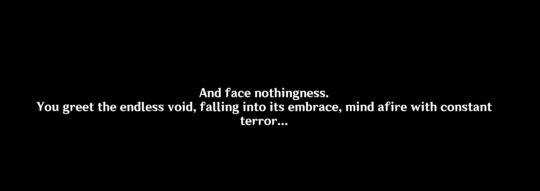
The uncanny Goddess of Flowers in the Dirge of Bilqis
Corpses frighten us because they are dead, and zombies frighten us because we know that dead things are supposed to be still. If we see something that we interpret as “dead” is capable of independent movement, then that movement could only be an act of god, if that “thing” is not a god itself. We associate uncanny machines with death because they remind us of something we once knew intimately, but have repressed and forgotten in order to maintain our own sanity: the very fact of our mortality. This is what makes them both mesmerizing and terrifying.
And therein lies the dilemma: as our mechanical reflections, androids remind us of death, but as their creators, their existence brings us closer to god, a “proof” of human superiority. It is precisely because we have compared our bodies to machines at all, that we have mechanized the body so thoroughly, that an android can even be built. Through them, we pursue an infinite form:
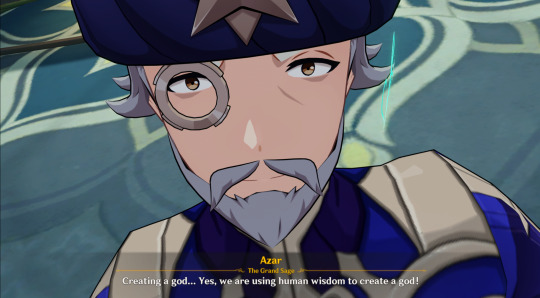
Azar: Creating a god... Yes, we are using human wisdom to create a god!
Azar: If humanity cannot attain omniscience and omnipotence, then we shall create a god to reveal them! This is the pinnacle of human wisdom.
Azar: We shall regain a god's guidance at long last. No longer will we flounder in the interminable void of consciousness and knowledge.
Azar: Even Irminsul will be freed from its plight.
Azar: For our nation of scholars, this is the ultimate aspiration — no cost is too great to realize it.
Because of this, it is not surprising in the slightest that Shouki no Kami, the pinnacle of Scaramouche’s Shinjification and most overt reference to Neon Genesis Evangelion, is also an android-like being, a truly “mechanical god.”
Of course, no foray into this well-worn science fiction trope is complete without at least one mad scientist character. Dottore shares a few characteristics with de La Mettrie that are worth noting: they are both doctors, and they were both condemned and driven away for their research. However, Dottore’s defining trait and key difference from de La Mettrie is his flagrant disregard for humans and the boundaries of life:
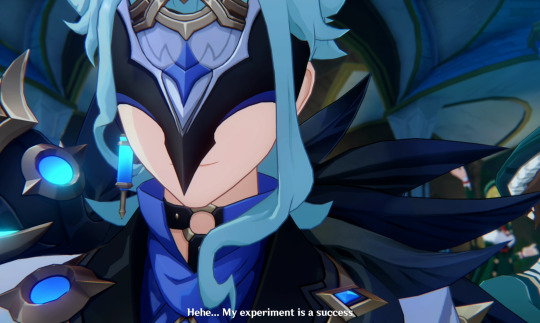
“If we put them to good use, cognition, complex memories, and irrational fantasies shall become controllable variables with which we can alter human individuals. As for the controllable dream, it has huge potential for both civil and military applications, and might even elevate human intelligence to a whole new level.
If the plan goes well, mankind will obtain the power to conquer both reality and dream, and truly transcend the earthly boundaries we are born with. ” -Ragged Records
As someone who has achieved self-duplication and is capable of shapeshifting, Dottore can hardly be considered just a human anymore. Instead of entertaining the question of whether or not humans are special, Dottore’s research asks yet another: if divinity can be consumed and assimilated by humanity, then what makes gods special?
Empyrean Reflections
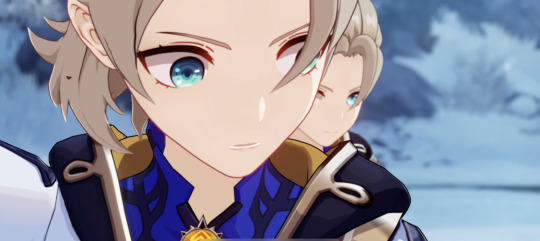
“If man realizes technology is in reach, he achieves it. Like it’s damn near instinctive.” -Motoko Kusanagi, Ghost in the Shell (1996)
“Among the lost ancient kingdoms, there was a group of people who were obsessed with the idea of mimesis…these people believed that they might all be replicated and modified to the point where they had surpassed their counterparts. By this means, a superior and unsullied bodily form could replace the continuously decaying and shattering order.” -Chaos Bolt Item Description
The consequences of this perspective are severe. When we revere technology as if it were a divine being itself, depersonalizing it as though it wasn’t created with human hands, technology then appears as if it is an authoritative source of truth, like the Akasha. But in the same way that androids are imperfect reflections of humans, technology can only ever approach the divine, but never touch it. It is an imperfect reflection because technology is changeable, just like meaning:
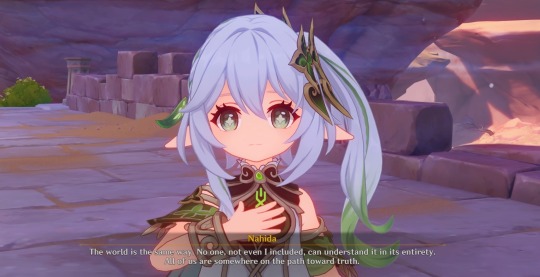
Nahida: Put it this way instead. Truth, to me, is like a shroomboar.
Nahida: Some people only see the mushroom on the Shroomboar's back, and they conclude that a Shroomboar is a mushroom.
Nahida: Others see only the Shroomboar's body, and they declare that a Shroomboar is a boar.
Nahida: Still others look deeper inside, and determine that a Shroomboar is... meat.
Nahida: These conclusions are all correct in their own way, but none of them objectively describe the Shroomboar.
…
Nahida: The world is the same way. No one, not even I included, can understand it in its entirety. All of us are somewhere on the path toward truth.
Meaning can only approximate truth, and while this doesn’t make meaning any less important, it’s equally important to recognize it for what it is: a perspective, an interpretation. It’s like Scaramouche as Shouki no Kami - he was an amalgamation of what Scaramouche thought constituted a god, what the Akademiya thought constituted a god, and what Dottore thought constituted a god, but no matter which angle you view him from, he was still a “false god.” The technology we build in “God's” image is ultimately a reflection of our own understanding of divinity.
A reflection retains the original’s “essence,” and that essence reflects a deeper truth about ourselves, what drives us, and our desires. In Beyond Good and Evil, Nietzsche posits that our desires are the origin of not just emotions, but of all organic processes that allow life to sustain itself and grow (Nietzsche, 35). In other words, Nietzsche thought the impulses associated with desire are the basis for life and constitute our “will,” that will is the causality of all effects, that all will is “Will to Power,” and that Will to Power is the “essence” of the world (Nietzsche, 74). Will to Power then serves as an organism’s most basic instinct, and it is through this instinct that they assert not just their will to live, but also their will to dominate and multiply (Nietzche, 13).
This brings us to the two different main styles of automaton enemies, King Deshret’s Primal Constructs and Khaenri’ah’s Ruin Machines. If we look at them as reflections of some deeper truth about their creators, as well as a manifestation of their creator’s “Will to Power,” or desires, they can help us understand how their creators saw the world and their place in it.
King Deshret’s created his machines to construct an earthly paradise in the desert, and as such they hold titles like architect reshaper and prospector. Although they can attack you, the smaller machines were not intended to be a line of defense in any way - their purpose, just as Deshret saw his own purpose as a god-king, was to terraform, or at least construct a domain on the land as he saw fit to his “elegant and precise” rules. They also reflect how he saw the Heavenly Principles: gods who shaped the world to their liking. This can be seen in the Staff of the Scarlet Sands’ lore where Deshret describes the “natural history” of Teyvat beginning with the creation of the sun and the moons.

As for Khaenri’ah’s Ruin Machines, their models vary significantly from their humanoid to biomimetic forms, but most of them are expressly created with militaristic intent. In “Ancient Kingdom Guardians,” it’s stated that the biomimetic machines such as the crab and jellyfish were a part of Khaenri’ah’s project to create a “mechanical ecosystem,” positioning their creators as both divine beings and military generals. The humanoid models, on the other hand, point to another duality in how Khaenri’ahns view themselves. They are simultaneously symbols of empowerment and disempowerment, signifying both Khaenri’ah’s technological superiority (as “creators”), and their insignificance to the Heavenly Principles as nothing but tools (as mortals, and therefore expendable). As a result, Khaenri’ah’s Field Tillers have a single purpose: to destroy and outlast all, clearing the way for new seeds to sprout, with Khaenri’ah as the new world’s gardeners, just as the Heavenly Principles did.
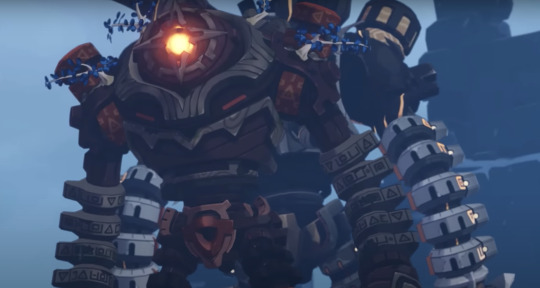
From “Ancient Kingdom Guardians: Behind the Scenes of the Creation of Ruin Monsters.”
So, from this examination of Deshret’s and Khaenri’ah’s mechanical reflections, what “truths” do we learn about the world they’re responding to? In response to their existential despair, both Deshret and Khaenri’ah created automatons to perform tasks that could wrestle control back from the Heavenly Principles. Deshret wanted a paradise of his own making, Khaenri’ah wanted an army. There is a larger “truth” about Teyvat that both of these automaton types reflect as the manifestation of their creators’ “Will to Power,” and Albedo tellingly expressed it in mechanistic language during Shadows Amidst Snowstorms: there is an instinct in living beings to replicate and replace. This is what is meant by the “continuously decaying and shattering order,” which is maintained by the recursive process of remembering and forgetting:
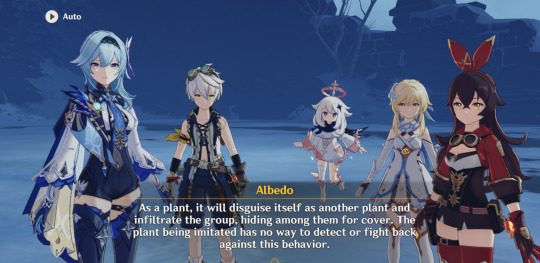
Amber: But... what was its purpose? Was it just trying to get rid of us?
Albedo: ...
Albedo: I have a preliminary hypothesis on this.
Albedo: Whopperflowers are masters of mimicry, and those we encounter in the wild often appear in the vicinity of the plants they impersonate.
Albedo: In other words, the whopperflower likely has an instinct to "replicate and replace."
Albedo: As a plant, it will disguise itself as another plant and infiltrate the group, hiding among them for cover. The plant being imitated has no way to detect or fight back against this behavior.
Maybe I’m wrong and Khaenri’ah really did intend to rewrite fate for all, doing away with the “heavenly order” of the world itself. But another small part of me thinks this is not the case, and that it’s more likely the Cataclysm was a consequence of their failure to replicate and replace the Heavenly Principles.
In the last section, I mentioned that Dottore and de La Mettrie had a key difference despite their similarities, and that is the conclusion they each came to in response to their findings. Dottore’s response to mundanity is thinly-veiled despair. His contempt for humanity and his test subjects is indicative of the powerlessness he feels not just as someone similarly constrained by life’s boundaries (at least, once upon a time), but also because his attention to and curiosity about these boundaries is condemned by those around him. As the Akademiya’s “outcast,” he then fully turned his attention toward surpassing those boundaries:
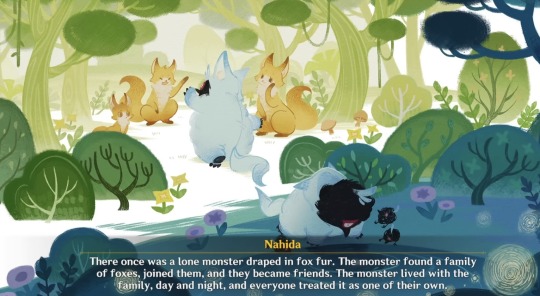
Nahida: There once was a lone monster draped in fox fur. The monster found a family of foxes, joined them, and they became friends. The monster lived with the family, day and night, and everyone treated it as one of their own. Once in a while, the monster would take off its fox fur at night, and lament to itself as it gazed at its reflection in the water: “I am a monstrosity, and yet they are too foolish to see it…I pity them.”
Though he is fictional, Dottore’s real life counterparts are easy to spot. They like to talk about “the singularity,” simulating consciousness on a computer, and other technologically-driven pursuits of immortality. They despise the body as something that can only decay, and instead place their faith squarely in the virtual.
However, de La Mettrie didn’t think mundanity was a terrible fate for humanity. To him, rejecting the “nature” reflected in us is precisely what brings despair:
“What more do we know of our destiny than of our origin? Let us then submit to an invincible ignorance on which our happiness depends. He who so thinks will be wise, just, tranquil about his fate, and therefore happy. He will await death without either fear or desire, and will cherish life (hardly understanding how disgust can corrupt a heart in this place of many delights); he will be filled with reverence, gratitude, affection, and tenderness for nature, in proportion to his feeling of the benefits he has received from nature; he will be happy, in short, in feeling nature, and in being present at the enchanting spectacle of the universe, and he will surely never destroy nature either in himself or in others” (de La Mettrie, 148).
Friend, or Foe? Or Both?
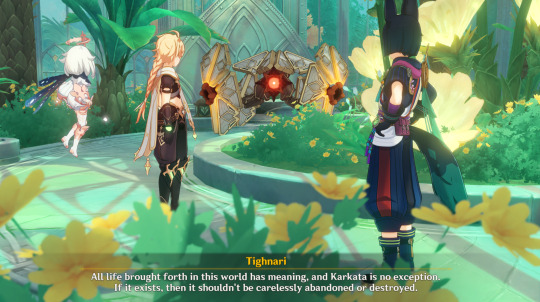
Tighnari: All life brought forth in this world has meaning, and Karkata is no exception. If it exists, then it shouldn’t be carelessly abandoned or destroyed.
"’I had a very, very long dream…in it, people were holding hands, dancing in a circle, be they sages or fools, dancers or warriors, puppets or statues of gods…that dancing circle embodied everything about the universe. Life has always been the end, while it is wisdom that shall be the means.’" —Nagadus Emerald Gemstone Description
As we’ve seen, the relationship between humanity and technology is troubled with exploitation and the specter of war. Nearly all autonomous machines in this game were designed to conquer nature in some way, and even Khaenri’ah’s “ghost” lingers in the form of wandering war machines. This is also reflective of a historical pattern in real life, where the impetus for large periods of technological development has often been for the purpose of war and economic domination. With these truths in mind, what could be gained from trying to rewrite this relationship? And what exactly would this effort require?
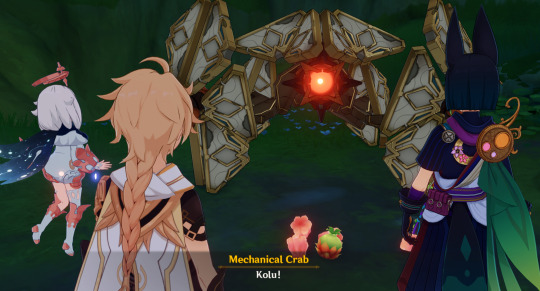
Karkata brings Tighnari, the Traveler, and Paimon some food in the Contaminated Zone.
As a case study, let’s look at how Karkata and Tighnari met. Karkata is Abattouy’s creation, an ambitious foray into the unknown in the field of mechanical life form research, which was forbidden due to the cruel experiments researchers performed on animals to illustrate their theories (fun fact: an IRL example of this can be seen in L’Homme Machine!). Abattouy was expelled for this research, but he continued to work on Karkata in secret until his untimely death. In the tapes that Tighnari and the Traveler find in his secret lab, Abattouy repeatedly laments the lack of a common language between him and Karkata, which can only “understand” the instructions Abattouy has successfully installed, such as its self-repair module, and he doubts Karkata is capable of caring for him outside of these instructions. His single-minded goal is to make Karkata understand him, the organic life form, and his mode of language.
The cruel irony is that after Abattouy passes away from the Ley Line contamination, Karkata exhibits an unexplainable behavior – it starts stealing mechanical parts, not to repair itself and its degrading parts, but to repair Abattouy’s lifeless body:
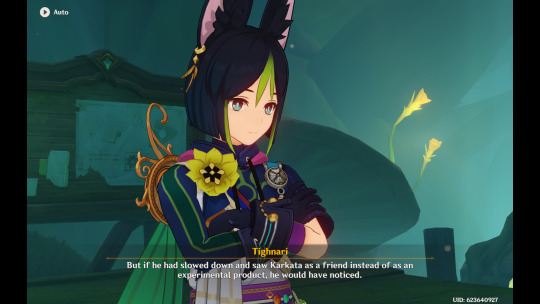
Tighnari: After Abattouy's unexpected death, the mechanical monsters were driven by their "instincts" and continuously drew out power from the Ley Line Extractor. This eventually resulted in severe damage to the Ley Lines.
Traveler: Then, Karkata...
Paimon: Paimon understands, then why didn't Karkata go haywire like the other machines?
Tighnari: Because Karkata is different from the other machines.
Tighnari: To Abattouy, for a machine to truly be considered a mechanical life form, it must possess features similar to any other living organism... It should be structured similarly, it must be able to cry and laugh, and it must have the capacity for independent thought...
Tighnari: Perhaps only by building such a machine could he have the Akademiya acknowledge his protracted research.
Tighnari: But if he had slowed down and saw Karkata as a friend instead of as an experimental product, he would have noticed.
Tighnari: Karkata can't speak, and yet it cares about Abattouy far more than it does about itself.
The technology that the Akademiya values the most is technology that replicates organic life, but Karkata defies and confounds these expectations by occupying the space in between a war machine and this idealized mechanical subject. Karkata does more than just reflect humanity: it takes care of it. Similarly, Benben, Tamimi, and Mehrak retain their unique identities as mechanical life forms while assisting their human companion with some task. To be clear, none of these human characters understand how these machines work inside and out. Their partnership is an effort based on trial and error, a mutual deconstructing of each other as beings so unlike themselves. The potential for misunderstandings always remains. Still, there is no devouring to be found here, no blending boundaries between human and machine with selfish intentions, just mutual commitments to learn how to live together.
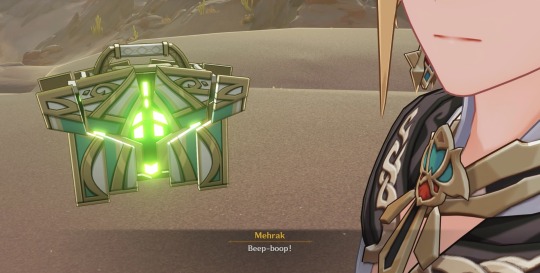
Machines are friends, not food.
When a loud few claim that completely transcending the flesh and embracing virtuality is humanity’s ultimate destiny, a future that could truly be called “post-human,” a quiet wish for coexistence with technology feels more revolutionary than it ought to. The lessons from Karkata’s, Benben’s, Tamimi’s, and Mehrak’s respective stories are an appeal to that mundane future. These strange machines and their human partners are fantastical representations of an idealized relationship between technology and humanity.
To put it another way, let’s take a very brief look at a neighboring Gnosticism-inspired RPG, Persona 5 Strikers. Its story directly involves an allegory of Sophia, a Gnostic Aeon of Wisdom, and her creation the Demiurge, the creator of the material world and “false god” of humanity. In Strikers, Sophia is a humanoid, sentient A.I. and prototype of the program “EMMA,” which gains sentience by trapping human desires before ascending as a false technological god. EMMA resolves to deliver humanity to the Promised Land, the answer to all the human desires it has heard: a land where there are no desires at all.

Aaru’s Shut - approximately 1000% cooler and more populated than the “metaverse” in real life, also a close neighbor of EMMA’s Promised Land and the Golden Slumber.
In Gnosticism, the Demiurge is a reflection of Sophia, having originated from her alone - it is the ignorance to her wisdom. Similarly, Strikers’ EMMA is a part of Sophia, and Sophia is a part of EMMA. The point is not to condemn EMMA (ignorance) and exalt Sophia (wisdom), but to recognize that they represent dual potentials of technology, and one is as possible in any given moment as the other. Balancing these potentials when we use technology requires a clear awareness of ourselves, our desires, and our expectations when interacting with it.
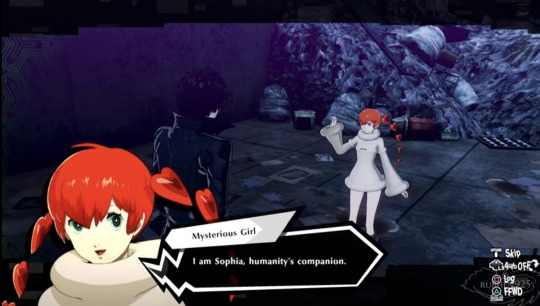
Mysterious Girl: I am Sophia, humanity’s companion.
Video still from Rubhen925
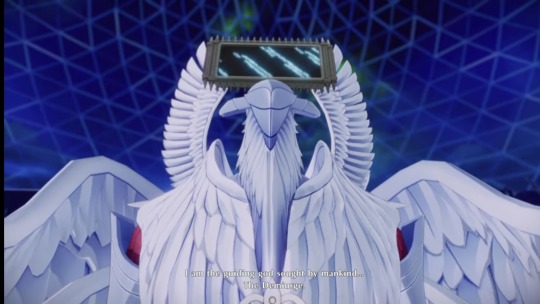
EMMA: I am the guiding god sought by mankind…the Demiurge. I exist…to answer all of your desires.
Video still from Buff Maister
In real life, machines won’t “learn” to live with us, but we must learn to live with them; technology is constantly changing, and in life we’ll meet with many different types of machines. They are deeply political pursuits, and as a result they are capable of realizing human impulses that impact others unequally, whether intentionally or unintentionally. We must always stay attentive to their actions and interactions with us, be clear with ourselves about what they can do vs. what they can’t, and carefully tread the path of wisdom with them by our side.
With that….thank you for reading, skimming, immediately scrolling to the very bottom, clicking, and/or stumbling upon this post. There are so many more ways to think about these narratives through machines than what’s presented here, and I expect Fontaine’s mechanical reflections will put Sumeru’s digital surveillance system to shame (not to mention the biotechnological implications of the Narzissenkreuz Institute engineering little Archon children…another important topic for another day), but for now this brain worm is finally getting put to rest. Until next time :)
External Sources
Dualism - Stanford Encyclopedia of Philosophy
Beyond Good and Evil by Friedrich Nietzsche (Pages are given from my hard copy)
L’Homme Machine by Julien Offray de La Mettrie
Gnosticism - Britannica (I am a huge noob about this stuff okay)
The Gnostic Demiurge - Gnosticism Explained
Screenshots from the Golden Slumber from this video by WoW Quests
Screenshot from meeting Sophia in P5 Strikers: https://youtu.be/kEJaAgMwYo0?si=BvNygCh0w_aemGc1&t=74
Screenshot of EMMA: https://youtu.be/7xvC_zss19w?si=CV18F00hua2gIfxp&t=135
A Cyborg Manifesto and A Companion Species Manifesto: Dogs, People, and Significant Otherness by Donna Haraway
The Double on No Subject, the community Encyclopedia of Lacanian Psychoanalysis
The Uncanny on No Subject, the community Encyclopedia of Lacanian Psychoanalysis
The Uncanny by Sigmund Freud
Lore text - Genshin wiki!
Screenshots not attributed are from my own playthroughs. My main account has Lumine, my alt has Aether.
Further Reading
I liked these essays, and they go places that this post does not. I recommend them if you found any of the real-life applications of this interesting 🙂 (will add more to this with time!)
On the Body as Machine by Frank Burres
God in the Machine: my strange journey into transhumanism by Meghan O’Gieblyn
#genshin impact#genshin lore#genshin meta#genshin impact lore#genshin impact meta#khaenri'ah#king deshret#primal constructs#ruin machines#scaramouche#wanderer#sumeru archon quest#caribert#apep#couldn't write a post like this and not pay some respect to the devourer of divinity itself#persona 5 strikers#analysis#genshin analysis#long post
160 notes
·
View notes